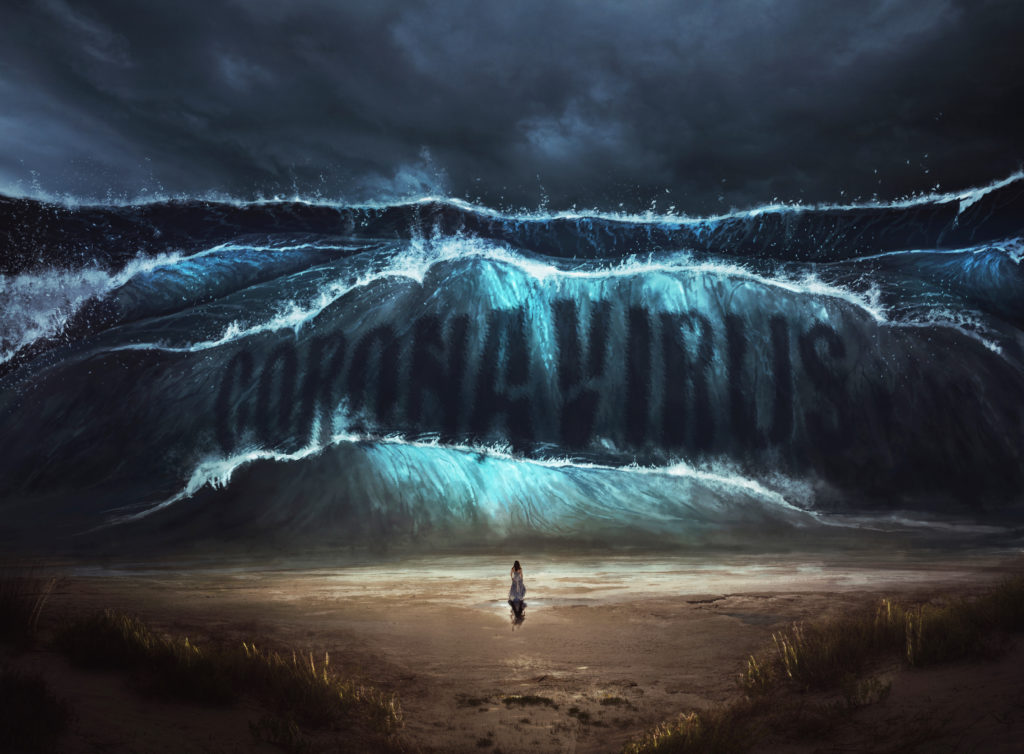
Funny, but it doesn’t look like the U.S. or the world will mark the anniversary of the coronavirus in the same way we have 9/11, Veterans Day, or MLK Day. But we should. Even though it’s been only three years this week since the world changed in ways that were previously unimaginable, the process of getting back to “normal” has helped us forget just what it was like this week back in 2020.
That’s the last thing we should do. Many of you did some of your best radio during those horrific, scary days, weeks, and months. We shouldn’t forget that. I’ve spent some time reviewing JacoBLOG posts during the first few weeks of hand washing, social distancing, broadcasting from home, and all the other changes AM/FM radio was forced to transition through in March 2020. Over the next couple of #TBTs, I’ll go back and exhume some of these posts, not to remind us of how bad things were, but to remember how radio stepped up when it counted. And perhaps why there still may be a lot to learn from what was accomplished during the greatest global emergency of all time.
For those of us at Jacobs Media, I believe we also did some of our best work during these days. Before March was out, we launched three coronavirus surveys – for commercial, public, and Christian music radio. For that first study (we did six more in 2020), 174 stations and three networks participated. I am proud to tell you we didn’t charge anyone – clients or non-clients – a dime. The results of these studies were shared with the entire industry – and as I was told, around the globe.
But more than research, we – like you – had to be smart, savvy, agile, and of course, resilient. And we had to put aside our own fears, concerns, and worries in order to do our jobs. If you remember, radio people were considered “essential workers.” At Jacobs Media, we spoke with our local government folks, and they concluded we were, too. We all should take away a sense of pride about that. Maybe we weren’t delivering milk and eggs, medical supplies, hand sanitizer, and other necessities, but radio people were delivering something just as important – hope and local resources that were in dire need – just three years ago right now.
Early on, I reached the realization that while the virus was a global pandemic, it was truly a local story. While trying to understand what was going on in China, Italy, and other parts of the world was important, getting a handle on what was going down in your city or town was critical. Which businesses were open? Did anyone have any tests in stock? What about hand sanitizer? Or toilet paper? Or food? What were city and state officials saying – and doing? Local, local, local.
So stop what you’re doing for five minutes today and read this post. We can learn from what we did so well, and take those lessons and apply them to our post-COVID activities. Without a doubt, it may be remembered as the most dire crisis we’ve ever faced. Let’s learn something positive from it, and remind our staffs just how much we valued what they did for radio, their communities, and the people they serve. – FJ
So, now the World Health Organization has declared what many of us have known for weeks – COVID-19 or the coronavirus – is, in fact, a global pandemic. It is not a hoax, it is not media hype. It’s the real deal, barreling down on us, impacting life as we know it.
Yesterday felt more like 9/11 than any day I can remember since my radio career began more than four decades ago. The NAB cancelled its huge Las Vegas conference, and AllAccess postponed its WorldWide Radio Summit scheduled for just two weeks from today. Like with SXSW and Coachella, Gordon Smith and Joel Denver had no choice under the circumstances.
Our lives are changing…rapidly. Yesterday, the NCAA announced the March Madness Tournament will be closed to public spectators. And last night, the NBA 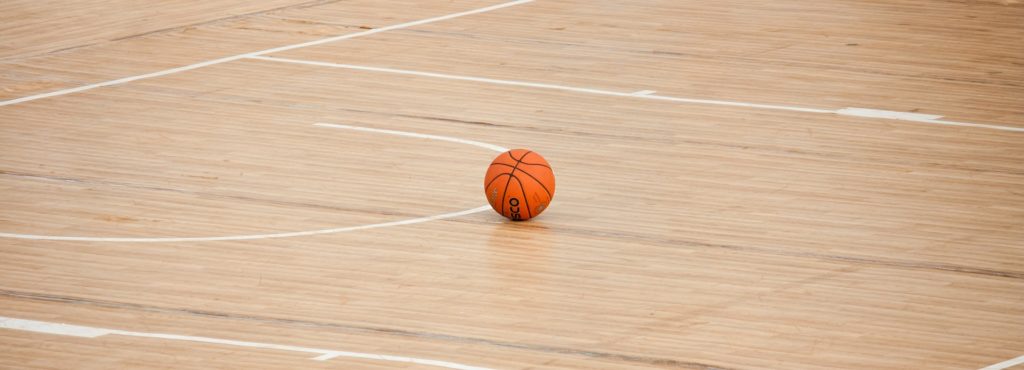 suspended its season until further notice when it was discovered Utah Jazz all-star center Rudy Gobert tested positive for the virus.
suspended its season until further notice when it was discovered Utah Jazz all-star center Rudy Gobert tested positive for the virus.
Will the NHL be next? And what about the start of the Major League Baseball season?
It’s looking more and more like big gatherings may be postponed or cancelled altogether. Many music radio stations are involved in concert ticket giveaways and station festivals. This changing landscape ought to prompt a marketing meeting before the weekend to discuss how this pandemic changes all that. There’s not much value in giving away tickets to an event that will probably get cancelled. Plus, the optics are bad, making a sponsor station sound out of touch with what’s going on. Never a good thing.
This situation feels very much unlike other disasters that have impacted the U.S. – wildfires, hurricanes, tornadoes. This one is approaching us like a slow-moving tidal wave. We know it’s coming, it’s trouble, and we’ve known about it for some time now. And in spite of that, we seem woefully unprepared to deal with it.
Part of the issue, as we’ve learned, is there is precious little data with which to go on. For reasons we may not understand for some time, the U.S. has been especially slow to test. And as us radio people know, trying to map out a complex strategy without the benefit of research usually doesn’t work out very well.
Despite the work of the CDC, Health & Human Services, and now Vice President Pence, it’s clear that “community spread” is happening locally – in Seattle, in New Rochelle, and soon in other places without much warning. As we’ve already seen, while federal help is wanted and needed, it is mayors and governors leading the charge, often without much guidance or a playbook.
And that should be a clue to those of us in radio about how this disaster will need to be covered. Because while SiriusXM can launch a Tom Petty channel that coves the life and times of that artist, their dedicated coronavirus channel (121, to be exact) is at best a generic resource, designed to cover COVID-19 on a large, national scale. The same is true with many of the podcasts that are springing up.
On-demand is great, until you hit a real-time crisis. And that’s precisely where we are right now.
Live & local.
This is one of those times when I feel fortunate I’ve lived through some of these existential crises before. Jacobs Media worked closely with our clients to get past 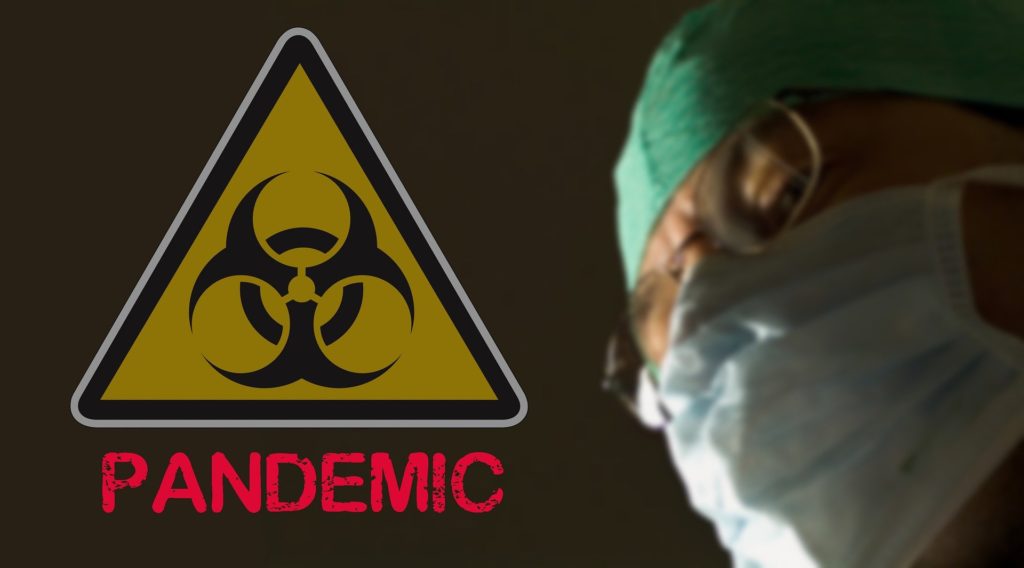 9/11. That’s when we started doing our stakeholder web surveys, the first of which was launched just a few days after the Twin Towers were leveled. It provided us with instant feedback on how radio listeners were thinking and feeling. And it changed our company.
9/11. That’s when we started doing our stakeholder web surveys, the first of which was launched just a few days after the Twin Towers were leveled. It provided us with instant feedback on how radio listeners were thinking and feeling. And it changed our company.
And then the financial crisis of 2008-09. We did our best to provide guidance in the face of that adversity. But let’s face it – music stations weren’t exactly in position to cover either of these disasters. That’s why so many turned over their airwaves to television coverage on September 11, 2001. And why coverage of the Great Recession was primarily left to television, financial news channels, print media, and news/talk radio stations.
This one’s different. It’s a pandemic, all right, and national leadership is important. We need to learn how to cope with the eventualities of the coronavirus crisis, whether it’s making our own hand sanitizer or better understanding how to protect our families, as well as those who are at the greatest risks. Anyone with a elderly relative in a senior living situation is wondering about their health and welfare.
Thankfully, online resources are improving rapidly. A good example is the CDC’s page, but there will be many others that crop up before long. This generic, national information is essential, of course, but after you learned how to wash your hands and disinfect your house, most people’s thoughts will be turning to their communities.
It feels like the issues and concerns that have many unsettled are happening right in their hometowns:
What schools are closed?
Which local sporting events have been cancelled? And will there be crowd size limits?
What businesses have closed or instructed their staffs to work out of their homes?
What local events are still taking place? And which ones have been cancelled?
How are the local hospitals coping with the impending influx of new patients?
Live & local.
That’s been the official broadcast radio mantra for years now, even though many companies and even more stations have gravitated away from its core principles. Voicetracking, syndication, and other cost-savers have created more generic-sounding radio stations. That doesn’t mean they haven’t been successful, of course. But when it comes to covering the local impact of COVID-19 in a meaningful way, many stations don’t have a plan in place, nor the infrastructure to do much about it.
Simply put, if you don’t have the horses, you’re not going to run a competitive race.
Many music stations are going to be providing a soundtrack to our angst-ridden world as long as this crisis persists. That’s not necessarily a bad thing. As we know from our Techsurveys, some radio brands are designed to do just that – provide escape and companionship, while helping buoy the audience’s spirits.
But for many other stations, there are resources and the willingness to step up and make a difference for your listeners and your community.
Radio Ink detailed Entercom’s news and information group’s activities. As you would expect for stations in that format, coverage is robust and will most likely be ramping up.
But what about music stations – especially in markets most impacted by this crisis?
I received a tweet from KISW on Wednesday, promoting Washington Governor Jay Inslee’s press conference on what Seattle is doing to face its unique COVID-19 challenge on the station’s Facebook page. Usually, that space is reserved for updates on upcoming concerts at the Showbox, Ozzy’s health, or where “Rockaholics” can purchase Men’s Room Red.
But not now. Things have changed, and stations like KISW must serve their audiences in entirely different, and more meaningful and relevant ways.
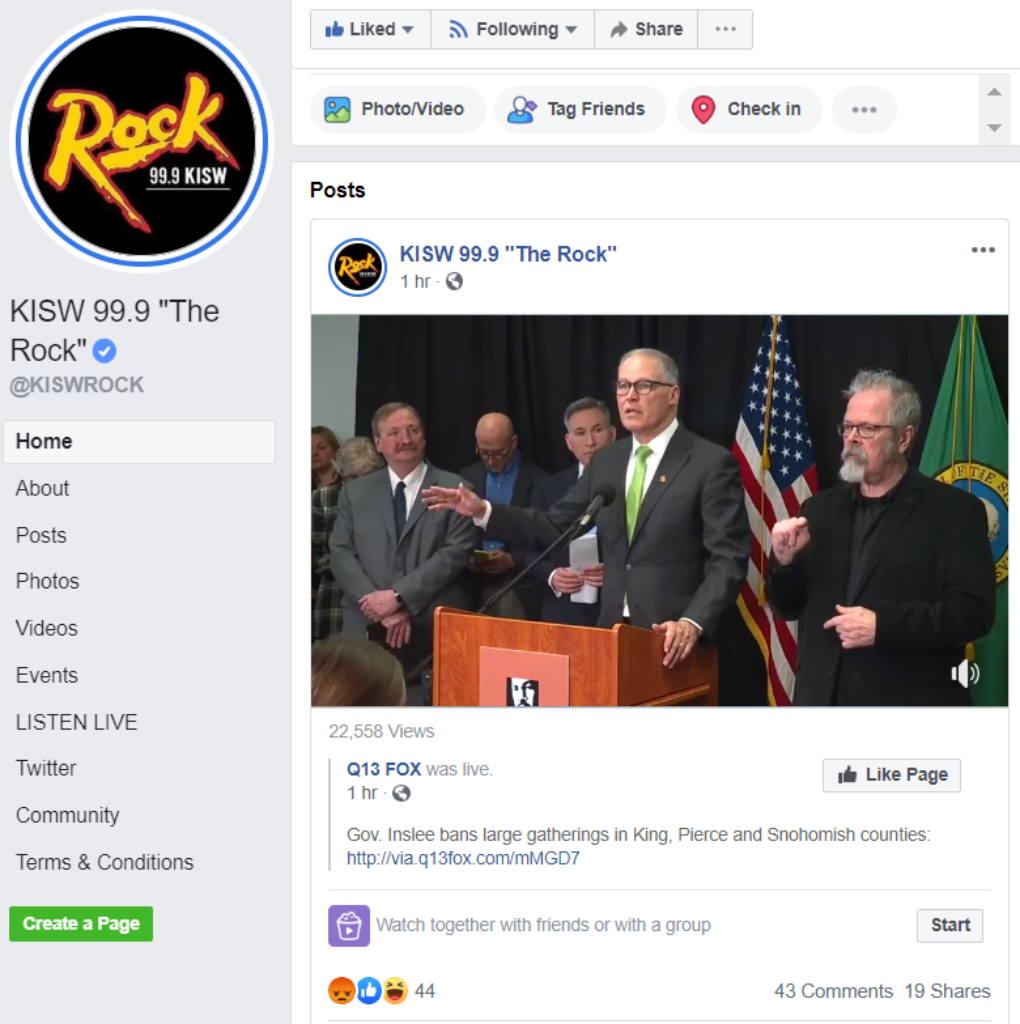
It’s a whole new day.
But it could be radio’s day to shine. And as we know all too well, we’re a traditional media platform that could use a chance to reprove its mettle by stepping up and serving its communities, particularly in this time of need.
That’s true for commercial, public, and Christian radio stations. We’ve talked about the former, but public radio stations have their work cut out for them, too. All the great programming from NPR and other networks won’t matter much to people in Oklahoma City or Orlando trying to figure out how to navigate their communities. “All Things Considered” and the “BBC News Hour” are wonderful shows, but public radio stations will have to step up their local coverage in order to be effective problem-solvers in this crisis.
There’s also a special place for Christian radio, tasked with providing inspiration, faith, and hope during the best – and worst of times. How that translates to COVID-19 coverage is a question I’ll leave to the great programmers in that format. But suffice it to say, just playing songs anyone can download from Spotify and put on a playlist isn’t going to distinguish anyone.
I want to show you something you haven’t seen from the upcoming Techsurvey 2020. We wanted to learn whether there is a gap between radio’s actual weekly reach as reported by Nielsen (and every broadcast radio CEO) versus the audience’s perception of the same metric.
Of course, our survey doesn’t represent anything close to the overall U.S. population. In fact, it is mostly comprised of radio fans, 46,000 strong this year, largely culled from radio station databases, and to a lesser extent, social media pages. These are people who, by and large, are drinking the radio Kool-Aid.
So, we know the 92% Nielsen figure, but what percentage of the population does the audience think radio reaches?
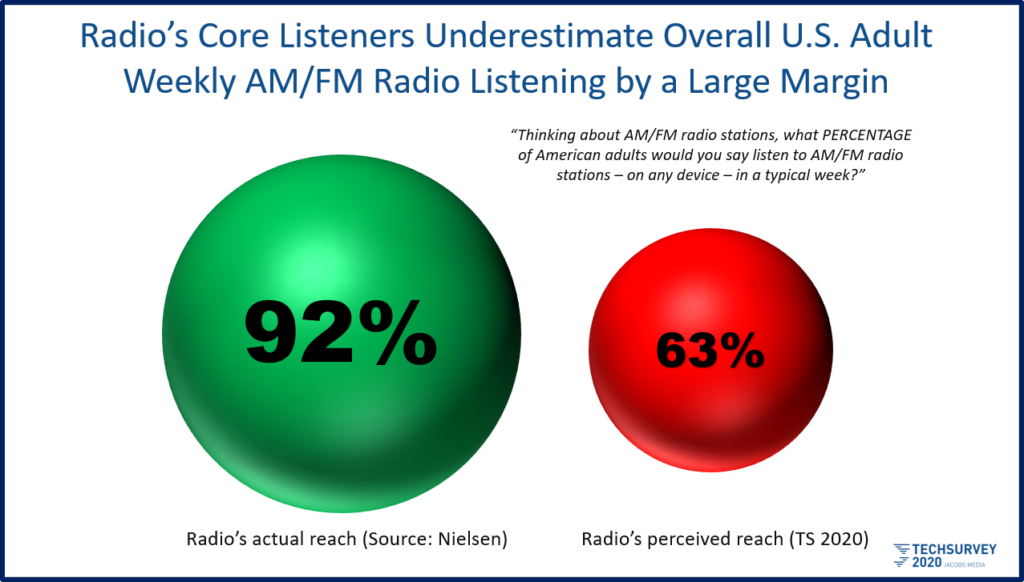
When our radio fans believe that AM/FM stations reach fewer than two-thirds of adults in this country, you can only imagine what the rest of the population must think. Or media buyers for that matter.
This speaks directly to broadcast radio’s perceptual erosion over the past decade or two. While radio’s usage metrics are actually pretty good, considering the quantity and quality of audio competition from satellite, streaming, podcasts, and the like, many people don’t believe the medium is all that healthy. As our data shows, many feel broadcast radio in the U.S. isn’t anywhere near as healthy as it is.
So, what a perfect time to for a little carpe diem action – seizing the moment, stepping up, and reminding consumers, the advertising world, and local communities just how important radio is in their lives; why “live & local” isn’t an empty, unkept promise, but a genuine commitment to lean into this crisis and do precisely what broadcast radio is supposed to do.
I’d like to believe broadcasters are having these meetings and think sessions. And not just to plot out how to keep stations on the air when talent can’t get inside their radio studios. Or how to make sure all that inventory actually runs.
Yes, those are legitimate concerns, but the bigger win, the greater hope is that broadcasters jump into this fire with both feet and provide the type of service that only local radio can.
Radio chieftains often complain we need to do a better job telling our story. Here’s the chance to write a whole new story – one that won’t require a PR team, but instead, a story people will be talking about for years.
This is not the time to be on-demand. It is the moment when real-time matters.
Live & local.
P.S. Early on, we launched a web page dedicated to coverage of the coronovirus. All the research and resources we collected are still there. You can check any of it or all of it out here. – FJ
- The Hazards Of Duke - April 11, 2025
- Simply Unpredictable - April 10, 2025
- Flush ‘Em Or Fix ‘Em?What Should Radio Do About Its Aging Brands? - April 9, 2025





Fascinating to review. Thanks for turning to the past a bit on this. I’d be interested in how the perception slide looks today.
Thanks, Chris.
When someone says “I don’t listen to the radio” — then says “because”….should we raise our hands at that point? Rather to hear why they STOPPED listening. . .don’t talk today if you don’t LISTEN today, right? I know. Semantics. But if you can’t speak from a position of knowledge, isn’t it better to just keep quiet?
And the 2022/2023 perception slide will be telling.